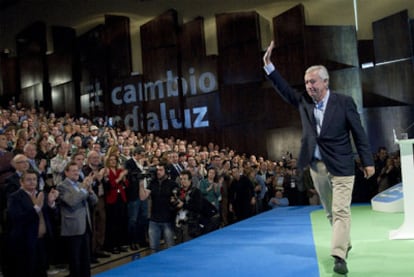History beckons for the PP chief poised to grab Andalusia
Javier Arenas has bided his time and now senses the erstwhile Socialist fiefdom is ripe for the plucking
In two months' time, the Socialists stand to lose the last of their traditional and biggest strongholds, Andalusia, after more than 30 years. And, if they do, it will be to someone who had a good stab at trying to grab a hold of that important region from them last time around in 2008.
Since that moment, Francisco Javier Arenas Bocanegra has never stopped campaigning for the regional premier's race. And now that Andalusia's elections have been set for March 25, he will once again get a chance to wrest control from the Socialists on behalf of the Popular Party (PP).
In 2008, even though it lost the elections, the PP got one of the biggest percentage figures of votes ever in Andalusia.
The regional Socialist government has been wracked by scandals and plagued by its unpopular economic policies, tailed by a whopping deficit, that have done little to help the region's alarming unemployment rate - one of the highest in the country.
The PP won sweeping victories in the 13 regions that held elections during the May 22 race. The Socialists only kept two: Andalusia, which will hold its elections in March, and the Basque Country, where the PSOE is in a governing partnership with the PP. Basque voters will go to the polls next year.
But now that the campaign has unofficially started in Andalusia with the announcement of the election date, the Socialists have already begun to warn voters that the PP will come in and make drastic cuts in an already withering region.
Susana Díaz, the Andalusia Socialist Party (PSOE-A) secretary, said that Prime Minister Mariano Rajoy has put the region on his "target" for drastic cuts. "The Socialists have the obligation to tell the citizens that Mariano Rajoy, Javier Arenas and the Popular Party have lied, and to warn about the upcoming immoral and embarrassing punishment that will come to Andalusia, which again is the region most punished by the PP," she said on Thursday.
Battered by a devastating 30 percent jobless rate, the Socialists in Andalusia have been dogged by a scandal stemming from allegations that money from a public fund set up to help pay for workers' layoff packages was given to people who were not entitled to these unemployment benefits.
The case, which could involve as much as 647 million euros in money embezzled on the Socialist watch, is under investigation by a Seville judge, and no doubt will be a major election weapon for the PP. But the ongoing investigation has shown that Arenas' father-in-law, lawyer Manuel Olivencia, may also have indirectly got around 120,000 euros from the fund as a legal advisor for companies that tapped into the government allotment to help pay firing costs for employees.
Nevertheless, Arenas, 54, is considered an "old political dog," as one columnist recently described him, and despite the allegations about his father-in-law, there are not many who do not believe that he can pull off this election.
Born in Seville and raised in Olvera, in Cádiz province, Arenas got his political start with Adolfo Suárez's Center Democratic Union (UCD) party in the early 1980s. After serving as president of the UCD's youth organization, he became deputy mayor of Seville and later a member of the regional parliament from 1986 to 1989.
He became head of the PP in Andalusia in 1993, and three years later Prime Minister José María Aznar appointed him to his government, where he served as Public Administrations minister and Cabinet chief.
Knowing that he faces a tough challenge if he wins the regional elections, Arenas has already made it clear that he would probably begin to pare down the size of government as his first cost-cutting measure. Among the issues he wants to look at is how much the Socialist government of José Antonio Griñán has been spending over the past year. According to Arenas, Andalusia is the "only region where [government] personnel spending continues to rise." He claims the regional government spent more than 3.5 billion last year but has stopped some 4.5 billion in infrastructure spending.
"This is precisely what you don't do during a crisis where you must stop runaway spending, cut your expenses, and increase investment," Arenas said during a news conference last July.

Tu suscripción se está usando en otro dispositivo
¿Quieres añadir otro usuario a tu suscripción?
Si continúas leyendo en este dispositivo, no se podrá leer en el otro.
FlechaTu suscripción se está usando en otro dispositivo y solo puedes acceder a EL PAÍS desde un dispositivo a la vez.
Si quieres compartir tu cuenta, cambia tu suscripción a la modalidad Premium, así podrás añadir otro usuario. Cada uno accederá con su propia cuenta de email, lo que os permitirá personalizar vuestra experiencia en EL PAÍS.
¿Tienes una suscripción de empresa? Accede aquí para contratar más cuentas.
En el caso de no saber quién está usando tu cuenta, te recomendamos cambiar tu contraseña aquí.
Si decides continuar compartiendo tu cuenta, este mensaje se mostrará en tu dispositivo y en el de la otra persona que está usando tu cuenta de forma indefinida, afectando a tu experiencia de lectura. Puedes consultar aquí los términos y condiciones de la suscripción digital.








































